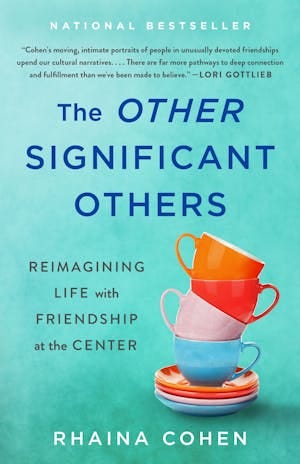Last Friday night, I went into Cambridge to attend a book event at a local independent bookstore. A friend of mine had written a new book about friendship (a little more on that later in this post!), the room was packed, the conversation was buzzing, the people in the audience asked thoughtful questions, a few of my deaf friends came along and we made a fun night of it.
In short, the event was awesome. I’m so glad I was able to attend. Seeing a bunch of people in a room talking about ideas (and books!) gives me such energy. I also love seeing writers have a space to share their thoughts, especially since I’m now experiencing just how HARD it can be to write a book. Massive kudos to anyone who does this!
I love going to book events — and for me they always involve lots of questions about access. Will there be an interpreter? Is the bookstore willing to arrange one? How much time will I have to take (and how many emails will I need to send) to convince them to get one? And have I learned about the event far enough in advance for any of this to happen?
You know, the usual go-around. (Any deaf folks reading this post will know exactly what I mean.)
Access labor is real, and the bookstore event I went to on Friday involved plenty of it. I’ll gloss over some details here, since my point is to highlight the hidden processes of access and the collective efforts they can require. (Especially for hearing readers who don’t often have to think about this stuff.)
After I contacted the bookstore to put in my interpreting request, I heard back that they didn’t have the funds to provide interpreters this time. They seemed sincerely apologetic, and they welcomed me to follow up and request interpreting for any other events later, and they’d do the best they could.
When I read their email, I was of two minds. First, I understood that narrow margins are a very real issue for independent bookstores, especially these days. And I was also disappointed. (We deaf folks often wind up feeling like we’re expensive. We often wind up being told “sorry, later, next time.”)
All right, then. I chatted with my writer friend, who insisted that she’d still love for me and any of my friends to come along. She wanted to find a way to make that happen. I jumped into texting some interpreters I knew, and then someone I’d worked with many times offered to interpret Friday night’s event pro bono. It was very generous of her. In the end, everything worked out great.
This is one open secret among deaf folks and interpreters: access is messy. It takes time, work, resources, conversations, compromise. It can feel dicey, especially when contacting various orgs asking if it’s okay if we show up (even if we also have a right to be there).
By now I am sympathetic to the reality that many orgs operate on small budgets. It’s just a fact. And I also know that access is something to plan for in advance. C’mon, let’s think together about how to get better.
I’ve had plenty of interpreter friends tell me over the years: If you want to go to something fun and local and you can’t figure out interpreting, let me know and I’ll try to step in and help. A good interpreter knows the issues that the deaf community often faces. Yet interpreters also deserve to be paid for their time and professional skills.
Access can mean taking a few hours out of your week to set up something that hearing people can just walk into at the last minute. It can mean leaning into community, into interpersonal connections, into work-arounds and offers to help figure things out. I often wind up feeling very complicated about all of this: yes, access is my right. In a perfect world, it would be there already. Yet we don’t live in a perfect world. Arranging interpreters does require resources, as well as time and energy and “self-advocacy.” Sigh.
I absolutely knew I wanted to go to this bookstore event. I knew it would be worth it to try and work out interpreting, and it was. I also appreciated that my friend Rhaina has written so thoughtfully about placing friendship at the center of your life — and here I was on Friday night, leaning into friendship and community ties in various ways, and grabbing the front row with some very cool deaf friends to boot. That was not lost on me.
I could say so many other things about her book, but please go check it out here! It’s very worth reading.
I’ll be thinking about bookstores + writing + access as I finish up my own book manuscript this spring. It all has me considering more layers of what it means to be a deaf writer. More on that another time.
For the time being, I’m wondering: what are some more strategies smaller orgs and bookstores could use for fitting accessibility requests into their programming? Including wild big new ideas! Systemic changes! Stories! Questions and musings! Feel free to comment and share.





Thank you for sharing this, Rachel! I organize the events for our store and this piece really made me think about how I can make our events more accessible and avoid putting people in this kind of situation. One thing your post made think about is how my store can develop relationships with interpreters in the community so we can have a list of folks on hand to call on when needed. Thank you for all you do and I am so glad it was a successful event. I can't wait to read Rhaina's book!
Man, deaf folk feeling expensive is a grim reality. Thank you for sharing and calling us to become more accountable, Sis. Rachel.